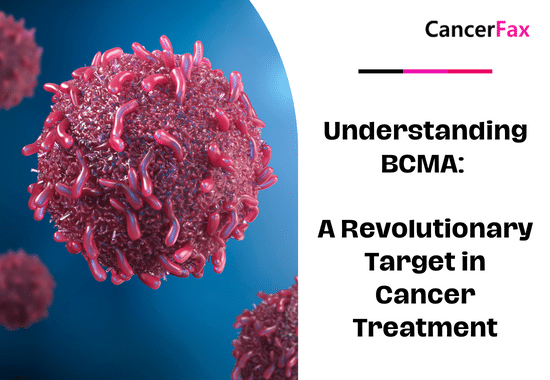Introduction
In the ever-evolving realm of oncological treatment, scientists persistently seek out unconventional targets that can amplify the effectiveness of interventions while mitigating unwanted repercussions. One such intriguing target is B-cell maturation antigen (BCMA), which has captured considerable interest in recent times for its prospective role in addressing hematologic malignancies, notably multiple myeloma.
Unveiling BCMA:
BCMA, which is also known as tumor necrosis factor receptor superfamily member 17 (TNFRSF17), is a surface protein that is mostly found on mature B cells, such as plasma cells, which are very important in the development of multiple myeloma. Its involvement in modulating B cell activities and viability renders it an appealing target for therapeutic measures.
As a blood cancer called multiple myeloma grows, plasma cells in the bone marrow multiply out of control. This causes bone loss, anemia, kidney problems, and weak immune system function. Despite strides in treatment modalities, multiple myeloma remains an incurable condition, underscoring the urgency for innovative therapeutic tactics.
BCMA as a Therapeutic Target:
The advent of immunotherapy has transformed oncological treatment by leveraging the immune system’s prowess to identify and eradicate cancerous cells. BCMA-targeted therapies present a promising avenue in this domain. To target BCMA, different methods have been looked into, such as monoclonal antibodies, chimeric antigen receptor (CAR) T-cell therapy, antibody-drug conjugates (ADCs), and bispecific T-cell engagers (BiTEs).
- Monoclonal Antibodies (mAbs): Tailored monoclonal antibodies aimed at BCMA have exhibited encouraging outcomes in both preclinical and clinical investigations. Antibodies like these can cause antibody-dependent cellular cytotoxicity (ADCC) and complement-dependent cytotoxicity (CDC), which kills BCMA-expressing tumor cells.
- CAR T-cell Therapy: CAR T-cell therapy entails modifying patients’ T cells to express chimeric antigen receptors that identify and bind to specific antigens on cancer cells. BCMA-targeted CAR T-cell therapies have shown amazing results in helping people whose multiple myeloma has come back or stopped responding to treatment, with response rates that are very high and remissions that last for a long time.
- ADCs are made up of monoclonal antibodies attached to cytotoxic agents. They allow the precise delivery of cytotoxic payloads to cancer cells that express the target antigen. BCMA-targeted ADCs have shown strong antitumor activity in preclinical models and are now being tested in clinical trials to see if they could be used to treat multiple myeloma.
- Bioengineered proteins called Bispecific T-cell Engagers (BiTEs) are designed to bind to both T cells and tumor cells at the same time. This makes it easier for T cells to kill cancer cells. BCMA-targeted BiTEs have been shown to selectively kill BCMA-expressing tumor cells in preclinical studies. They are now being looked at as a possible treatment for multiple myeloma.
Clinical Progress and Obstacles:
The clinical progression of BCMA-targeted therapies has gained momentum, with several agents progressing to advanced stages of clinical trials. The U.S. Food and Drug Administration (FDA) accelerated the approval of idecabtagene vicleucel (ide-cel or Abecma), a BCMA-targeted CAR T-cell therapy, in March 2021. It is used to treat adult patients with relapsed or refractory multiple myeloma. This pivotal approval marked the first CAR T-cell therapy sanctioned for multiple myeloma and underscored the therapeutic potential of BCMA-focused therapies.
Despite these advancements, challenges persist in optimizing the efficacy and safety of BCMA-targeted interventions. A notable obstacle is the emergence of resistance mechanisms, leading to disease recurrence in certain patients. Strategies to surmount resistance, such as amalgamating therapies and developing next-generation BCMA-targeted agents, are actively under scrutiny.
Another hurdle is managing treatment-related adversities, notably cytokine release syndrome (CRS) and neurotoxicity, which can manifest with CAR T-cell therapy. Endeavors to alleviate these adversities through patient surveillance, supportive care measures, and crafting safer CAR T-cell constructs are ongoing.
Future Trajectories:
The future landscape of BCMA-targeted therapy in multiple myeloma appears promising, with ongoing research aimed at refining treatment strategies and broadening their scope. To make antitumor treatments more effective and fight resistance, researchers are looking into new combinations of BCMA-targeted drugs, immunomodulatory drugs, proteasome inhibitors, and other new drugs.
Also, work is being done to make BCMA-targeted therapies work on other types of blood cancer and solid tumors that express BCMA, like Non-Hodgkin Lymphoma and solid tumors of epithelial origin. These initiatives have the potential to diversify the therapeutic panorama and enhance outcomes for a wider spectrum of cancer patients.
BCMA stands as a promising focal point in cancer therapy, particularly concerning multiple myeloma. Adopting BCMA-targeted therapies like idecabtagene vicleucel is a big step forward in the field of oncology and shows how immunotherapy can change things for the better. With ongoing research and clinical strides, BCMA-targeted therapies are poised to assume a pivotal role in shaping the future of cancer treatment and elevating patient outcomes.


